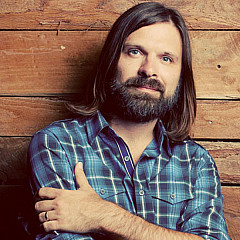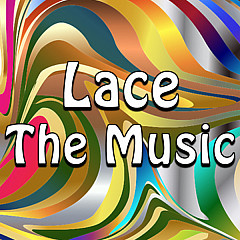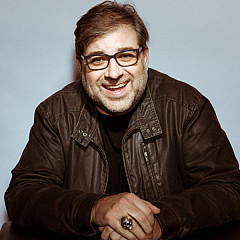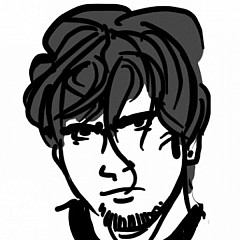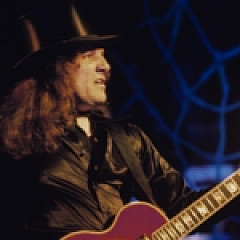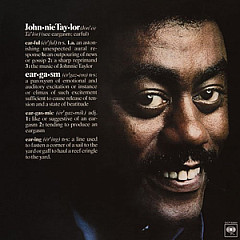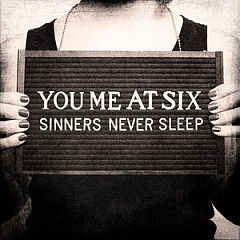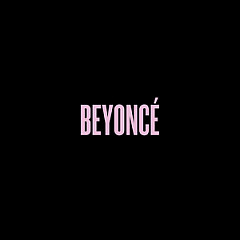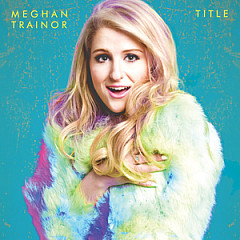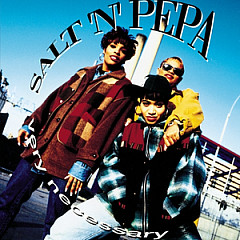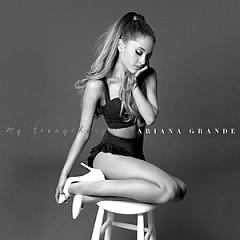He had the good sense to stay true to himself, which isn't easy when you've been famous (and he was famous - poke around YouTube and you'll see how much content he provided the entertainment press). His second act was fatherhood (four children with his wife, the fellow Canadian singer Julie Masse), mentoring and producing other artists, and recording new songs that go right to the ears of his fans via coreyhart.com.
In America, Hart notched a startling nine Top-40 hits from 1984-1990, and while he never got a whiff of chart success in the UK, he's a superstar in his native Canada, where he hit the Top-40 28 times. In this interview, he tells the stories behind some of these hits and explains what inspires his songwriting.
 Carl Wiser: (Songfacts): Here in America, "Sunglasses At Night" has endured as a classic. What's the story behind that song?
Carl Wiser: (Songfacts): Here in America, "Sunglasses At Night" has endured as a classic. What's the story behind that song?Corey Hart: In the early Spring of '83, I was a starry-eyed 19-year-old kid from Montreal recording in a studio near Manchester, England. By late May, approaching my 20th Birthday, I finally held in my hands a cassette which contained the finished recordings of eleven original songs that would comprise my First Offense album debut.
However, there was one more song to come. Track 12, "Sunglasses At Night." It was not yet written but the idea had already begun a subterranean journey through my creative subconscious. It rained almost every day I was in the UK for those sessions. I had a pair of Ray Ban sunglasses with me but I never had the chance to use them.
Later that summer my album was delivered to Aquarius-Capitol Records. Everyone seemed very pleased with the results. I was kinda like a writing magnet in those days so the song ideas kept flowing even though we were done with the recording. I started messing around with a melodic line and phrase called "My Cigarette Got Wet." It is an ironic lyric because I have never smoked in my life. It was the nascent embryo of "Sunglasses" although I didn't realize it. I actually recorded a demo for "Wet" which had many musical elements of "Sunglasses" but I wasn't really sold on the song.
One night I went back to the "Wet" demo and sang out the lines, "I Wear My Sunglasses At Night" over the melody. Wow. Just like that the song was born. It now spirited a cooler cadence from the new lyric that was missing before, plus I changed a few chord progressions. I wanted to add it to my album on the spot. Impossible, I thought, we'd already spent the full recording budget. But I will call the label first thing in the morning anyway and plead my case.
When it was released in November 1983 I remember hearing the song for the first time on CHOM-FM in Montreal, but I only caught 30 seconds before I blew out my car speakers because I had cranked the volume up to overload!
I think I first knew I had a hit on my hands when I landed in the Detroit airport en route to my first US tour as opening act for Rick Springfield in June 1984. I was mobbed at the airport by frenzied fans. We needed security to get me through the terminal to catch the connecting flight. It was a surreal experience. The song climbed slowly but steadily up the Billboard charts into the Top 10 that summer as I crisscrossed the US on a massive radio-concert promo tour.
I believe the video played a key role in establishing a strong image for me that certainly impacted the song's success. Music videos at that time were a new, exciting and innovative genre for record promotion. Within a few weeks of heavy MTV play your face and song would be known from coast to coast.
Last week I was on a crowded rental shuttle bus at Miami Airport on my way to pick up our car. The radio was blaring out "China Girl" by David Bowie. As the tune faded out it segued into the next song, I heard the hypnotic intro riff of "Sunglasses At Night" fill the air. Some folks started to tap their feet. I glanced over at my 13-year-old daughter. We both had big smiles on our faces. Yeah man, it still feels super cool to hear it - even after all these years.
Songfacts: What were some of your life experiences that led to the song "Never Surrender"?
Corey: My mother influenced me with this ethic of never quitting on yourself or your dreams no matter how challenging or daunting. I also greatly admired Sir Winston Churchill, reading many biographies on his life. He used this expression "Never Surrender" during the dark days of the Nazi attacks on Great Britain as a motivating inspiration for his countrymen.
Songfacts: You have described yourself as a very shy youth. Is that reflected in any of the songs you wrote?
Corey: "Jenny Fey." Yes I am very sensitive.
It was December 8, 1980. Erika (my first girlfriend) and I had just returned from a movie date. Not sure which one we saw that evening but on the drive back home from dropping her off I heard "Imagine" on the Montreal radio station I always listened to. The DJ announced as the song ended that the legendary John Lennon had just been shot down in New York City in front of his home at The Dakota. I was incredulous. I just sat in the car completely stunned. That night every Montreal radio station played John Lennon or Beatles songs. "Hey Jude," "Let It Be," "Strawberry Fields Forever," "Eleanor Rigby."
But this last one somehow left me captivated, entranced as I sat alone in my car just listening. In an instant, one single moment of random insanity, the world needlessly lost a musical genius. In those early pre-fame days, I somewhat associated myself with John Lennon because I was in love with Erika who was half-Japanese (hence "Eurasian Eyes" written in 1985), and Yoko Ono was Japanese. Lennon was a profound songwriter, something I aspired to become one day. "Woman" was one of our special songs together, Erika and I.
I was inspired, motivated, all the melodies running through my brain, my blood, my musical heart beating wildly. I raced upstairs to our apartment. My mom was at home as always, sitting alone watching TV by herself. It was close to midnight. We talked briefly about the senseless murder. I looked at her. I heard the music of "Eleanor Rigby." I told her I needed to compose right away, maybe all night long. I hoped the music droning, pounding, wouldn't keep her up. I then went straight to my piano. I began to write the nascent dreams of "Jenny Fey." I thought about my mom"s life. Her melancholy, her utter loneliness. My father had meant everything to her. He was like her existence. She married when she was just 17 years old. Can you believe? When their marriage ruptured after five children together, she clung desperately close to her last baby boy, Corey. Ironically, I resembled my father physically more than any of my other siblings.
The bond between us is stronger than mighty winds or oceans which might geographically separate us now. Our bond is inviolate. She has always loved me unconditionally. She has always given me the purity of her heart to follow my music. I may not have had a father like I longed for but I had my special Mom. I wrote "Jenny Fey" for Mina Weber Hart. I was 18 years old. Ah, it feels like a century ago but I remember staying up past 4 a.m. that December night still working on the choruses, verses. I finished the song by morning's light.
O can't you hear the lonely crying in the world
Yet the Jenny Feys go on
Jenny Fey has got no friends, she feeds her cat and knits amends
Jenny Fey would smile a song but now her face is sad and drawn
I am forever grateful for the guidance and immense talent of my two UK Producers Jon and Phil. One afternoon while Jon and I strolled the park with his two young daughters near their home in Twickenham, he casually turned to me and said, "I thought of ringing up Eric to come play on Jenny Fey." Eric?? "Eric who?" I asked, confused. Jon replied with his cheeky soft grin, "Eric Clapton, playing on dobro perhaps." Holy shit, Miracles!
The experience of watching Mr. Clapton record his dobro will always remain one of my true career highlights. While he played so gracefully you hear his deep breathing through the open mic. As if he was living through the song, becoming a part of the song's soul through the process. When he finished and came into the studio for a playback listen, he looked towards me, as I was kind of sheepishly hiding in the corner trying not to get in the way. He gently expressed words I shall never forget: "What a very pretty, sensitive song you wrote there Corey." Wow! Thank you Mr. Eric Clapton.
Songfacts: What is one of your songs that means something different now than when you wrote it?
Corey: "It Ain"t Enough." Summer of 1981, I was driving south from Montreal on the I90 in a Mazda GLC car having just turned 19 years old. I was emboldened with energetic youthful enthusiasm but deep down scared shitless of the great unknowns awaiting me. I actually got pulled over by the police outside of Albany. I was speeding so fast with the cassette blasting Nick Lowe's "Cruel To Be Kind" that I had no idea cops had been following me for a while with sirens blaring. Almost got arrested because I didn't have my Canadian passport with me (just my driver's license) - no autographs to save my butt in those pre-fame days.
Four hours into the trip and I already had a hefty speeding ticket with a redneck sheriff. So with my heart pounding I drove the rest of the way like a snail. I was eager to spend that summer in Long Island, New York being afforded a golden opportunity of working with some of the musicians from Billy Joel's hot band. I recorded several demos over the summer in pursuit of finally landing my first record deal. I had been trying since I was 11 years old. My first night in the studio I met Billy, Lisa Dal Bello and Aldo Nova. Pretty cool eh? Lisa and I became friends. I played live gigs several weekends in a music club restaurant with some members of the BJ band. On a few Sunday nights, I would also perform in the club alone at the piano. No one really payed me any notice though. After a while, it felt as if I was singing to an empty room, although I could always hear chatter or laughing in the background. A far cry from the scream-fest glory days of my Boy In The Box tours to come which I much prefer! It also marked the first time that I ever made money for my musical talents. The club owner would pay me $35 in cash per Sunday for 1.5 hours of singing. Wow. I was rich! I would always slip in a Bee Gee song like "To Love Somebody" or Billy Joel"s "Honesty" to try to get the crowd listening. It didn't help much.
It's interesting how a song that I admired like "Honesty," (perhaps my favorite BJ song) only went as high as #24 on the US Billboard charts. It made no sense to me. Not even Top 20?? I later used this rationale of the crazy music business not "making any sense" to try and assuage my disappointment and genuine hurt when songs like "In Your Soul" or "Everything In My Heart" peaked in the 30s on the very same US singles Billboard chart.
My songwriting was prolific in those early days. I would spend all my waking hours at piano chipping away melodies and lyrical ideas. When you're young you don't think of time structure in the same orderly fashion we do as adults. At least I didn't. I only wanted to write, sing, sign my recording contract. It was all the air I needed to breathe. Nothing else mattered. I would often eat meals at the piano because I didn't want to interrupt the creative process. I was dating Erika - my first true girlfriend - but she was back in Montreal. She visited me for two weeks in July. I probably wrote over 50 tunes that summer. Yes. One of them in the mix was called "It Ain't Enough." I confess this song is very sentimental for me, one of my favorites. It is Corey straight down to the core. The chord sequence, melody, phrasing, even the pouting in my voice. It was a song that defined me as a young budding songwriter. It represented a big step in my creative evolution when I wrote it at 19.
I could capture all the love the great romantics had
Sing you a song that ain't half bad
But that ain't enough
That ain't enough for you
I was using alliteration techniques which I found really effective in songs. I later applied the same style in "Sunglasses At Night," repeating "so I can, so I can," but who was I singing about if I was happy in my relationship with Erika? This may come as a surprise, but it was not for a girl. It was written for all the record labels that kept rejecting me. By late August when I wrote the song, several companies in New York City had already passed on my material. I felt rebuffed again. I couldn't understand why they didn't like me. What was I doing wrong? What do they freaking want!?
It Ain't Enough, It Ain't Enough
Nothing's enough for you!
I took these emotions, sculpting them into a love song of unrequited love. Of never quite matching up to their expectations. Never being good enough.
I could carry the weight of your sad times dear
Give you the strength to face your fears
I know I'll never be afraid to say
I'm here by your side and I'm gonna stay
These lines in the bridge were nascent, seminal lyrical themes I repeated for future compositions like "I Am By Your Side," "Always" and "Baby When I Call your Name." These words were for Erika.
I could pour you a drink like I pour out my heart
Smile when I'm sad and act dumb when I'm smart
Those lines were my attempt at transcending the silly love songs I was determined not to write. I always wanted to compose meaningful, intelligent lyrics without being preachy or pedantic. Of course whether I succeeded or not is subjective. I was listening to the Nick Lowe album. I discovered another song I liked on it called "You Make Me." A really slow, sparse, simple ballad. It was a love song that inspired me with colors for "It Ain"t Enough."
There is no explanation for musical influences. All musicians are influenced subconsciously or consciously. It is as natural to sunrise as sunset. "It Ain't Enough" was awarded as a Socan Canadian Classic song in 1996. I am so grateful for the sincere appreciation and love my fans have given to this song.
Songfacts: In your work as an artist - writing, performing, producing, etc. - what do you find most rewarding, and why?
Corey: I enjoy them all truthfully for varying reasons but above all the songwriting process is undoubtedly the most gratifying for me because without the song there is no music, concerts, recording. Music is what breathes.
Songfacts: What are some examples of movies, TV shows or books that have inspired lyrics in your songs?
There is a new song called "Sail Away" which can be purchased on my website coreyhart.com that was inspired by the film Sarah's Key.
As for TV shows I don"t think this has happened yet. Maybe I need to watch more.
Songfacts: What's going on in the song "Boy In the Box"?
Corey: It was written about James Dean. I was often compared to him by the media when people saw me in videos or interviews. Here is a prime example.
Songfacts: After you had kids, how did your songwriting change?
Corey: It slowed down big time. :) I recorded two albums in the mid-'90s after signing with Sony Music. Many of the songs were influenced by being a father for the first time. "India" was a song I wrote for my first child. "Every Time You Smile" was for my second daughter Dante. "Jade" was for my third daughter named River, and if you go on my web site you can hear an unplugged acoustic performance of a song I wrote for our fourth (and last) called "Rain."
Songfacts: Of your '80s hits, which one was the most personal, and why?
Corey: There are too many to list in the category of most personal.
Songfacts: How do you typically write a song?
Corey: Ninety percent of the time I have a lyrical idea or phrase which inspires the rhythm cadence and mood.
Songfacts: What's an example of a song that came to you very quickly, and does that happen a lot?
Corey: "In Your Soul," which is one of my personal favorites, came about very quickly within a few hours. It is not always the case - in fact it usually takes several weeks. I wish that I had taken more time with my lyrics on some of the early albums but I was given a few months to write and between 1984-1990 I released five albums with nine consecutive Top 40 Billboard Singles. I guess I was doing something right.
June 27, 2012
More Songwriter Interviews

